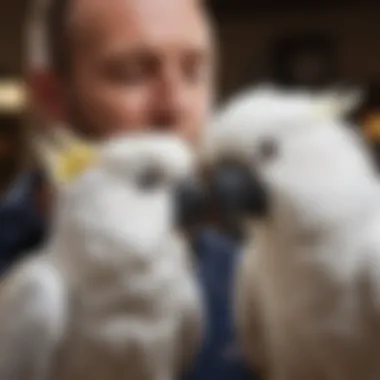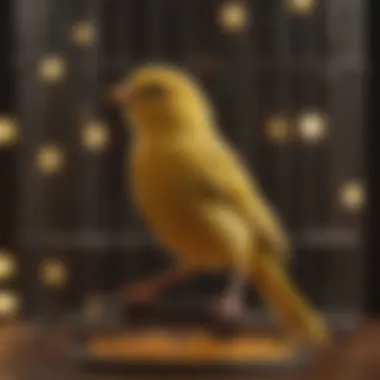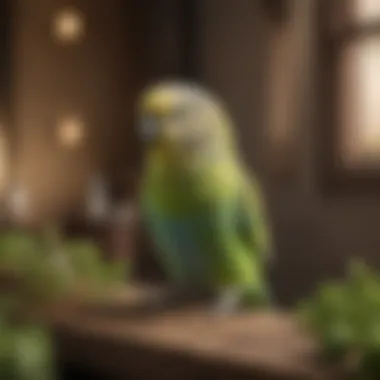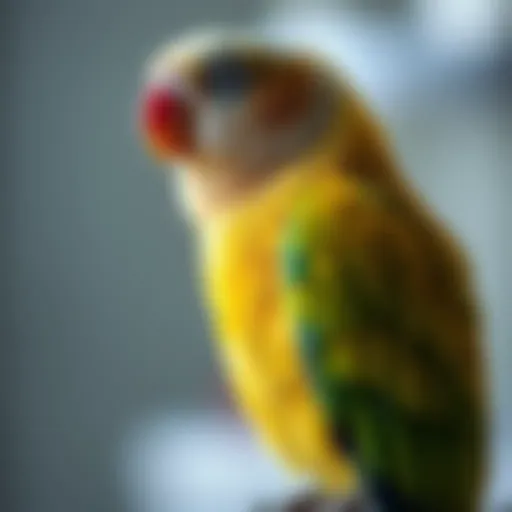The Best Birds to Have as Pets: A Comprehensive Guide


Intro
Choosing a bird as a pet can be a fulfilling experience. Birds offer unique companionship and can enrich the lives of their owners. However, understanding their needs and behavior is crucial for a harmonious relationship. This guide aims to facilitate a deeper comprehension of what it means to have a pet bird. Through careful consideration of care requirements and behavioral traits, potential bird owners will be better equipped to make informed decisions.
Understanding Your Pet
Pet Behavior Basics
Birds, like any other pet, have distinct behaviors that are important to grasp. Each species exhibits unique patterns of interaction and socialization. For beginners, knowing how birds communicate can enhance the bonding process. For example, some birds are naturally more vocal, while others may be quieter and prefer solitude. Understanding these traits can significantly impact how owners relate to their feathered friends.
Common Breed Characteristics
Different bird breeds come with specific characteristics that determine suitability for various households. Parakeets, often considered beginner-friendly, are known for their playful nature. On the other hand, species like cockatoos require more social interaction and mental stimulation. It is paramount to research these characteristics such as size, temperament, and energy levels to find the right match.
Species-Specific Needs
Each bird species possesses particular needs that, if not met, can lead to distress and health issues. For instance, some birds flourish in larger cages requiring more space to move, while others are content in smaller environments. Dietary needs also vary widely. Parrots may thrive on a diet higher in fruits and vegetables, while finches require a different nutritional profile. So, performing due diligence on the species you are interested in is essential for their overall wellbeing.
Pet Care and Maintenance
Feeding Guidelines
Proper nutrition is foundational to a bird's health. Seeds may form a part of the diet but should not constitute the entirety of it. A balanced diet including pellets, fresh fruits, and vegetables is ideal. Each species has its specific dietary needs based on age and health, so consulting with avian nutrition resources is advisable to ensure the bird receives adequate nutrients.
Grooming Essentials
Regular grooming is essential for the wellbeing of pet birds. This includes nail trimming and, for some species, feathers as well. Some bird owners may also consider baths or misting as part of the grooming routine. This not only promotes hygiene but can also improve bonding time between the bird and its owner.
Hygiene Practices
Maintaining a clean environment is crucial for health. Regular cleaning of cages, perches, and toys helps to prevent the spread of disease. A hygienic habitat reduces the risk of infections and keeps the bird mentally stimulated.
Training and Development
Basic Commands and Skills
Training a bird can augment the bond between the pet and its owner. Basic commands such as
Prologue to Pet Birds
Birds have become increasingly popular as household pets. Their captivating colors, diverse species, and engaging behaviors attract many individuals and families. This section aims to elucidate the significance of pet birds, emphasizing their unique qualities and potential benefits. Understanding these aspects is crucial for anyone considering the addition of a feathered companion to their home.


The Appeal of Birds as Pets
The appeal of birds as pets is multifaceted. Firstly, birds are known for their charming personalities. Many species are social, playful, and interact well with their owners. This interaction can lead to strong bonds and a rewarding companionship experience.
Additionally, birds come in various sizes and colors, making them an attractive option for many homes. From the small and colorful budgerigar to the more imposing African Grey parrot, there is a bird to suit every preference
Moreover, birds can be relatively low-maintenance compared to traditional pets like dogs or cats. They don’t require walks, and their grooming needs are generally lesser. However, it is essential to understand that they need regular social interaction, mental stimulation, and proper care to thrive.
What to Consider Before Getting a Bird
Before deciding on bringing a bird into your home, several considerations should be made. First, assess your lifestyle and living situation. Birds are lively creatures that may not suit every household. Consider if your environment can accommodate a bird's social and space needs.
Next, research various bird species. Different birds have different temperaments, noise levels, and care requirements. Understanding these differences ensures a better match between the bird and your home life.
Additionally, potential owners should consider the commitment involved. Birds can live for many years, often decades. This long lifespan requires a lifelong commitment to their care and companionship.
In summary, being informed and prepared is essential before adopting a pet bird. Engaging with local birds’ communities or reading comprehensive guides can help in making a well-informed decision.
Characteristics of Ideal Pet Birds
In the pursuit of companionship and joy that pet birds offer, understanding their characteristics is essential. This section outlines the factors that make certain bird species more suited for home life. Recognizing these qualities helps potential bird owners select a pet that fits their lifestyle and environment, leading to a more fulfilling relationship.
Temperament and Sociability
Birds are social animals. Their temperament can define the relationship they have with their owners. Some birds are naturally inquisitive and enjoy interactions, while others may be shy or require more time to acclimate. For instance, Cockatiels are known for their gentle nature, making them great companions for families. On the other hand, African Grey Parrots are celebrated for their intelligence and complex social behaviors, but they may need more engagement to thrive.
When choosing a bird, consider the time you can dedicate to socialization. Birds such as Lovebirds are very affectionate. They often bond closely with their owners. Parakeets, colorful and lively, also thrive on interaction. Hence, it is important to understand the social needs of the bird species you are considering.
Sound Levels and Noise Considerations
Noise is another crucial aspect when considering a pet bird. Different species produce varying sound levels. Some birds, like Finches, are quieter. They can fit well in homes where sound levels need to be managed. In contrast, Conures are lively and can be quite loud. This makes them less ideal for apartment living.
Assess your living situation and consider how much noise is acceptable for you. Some people are content with occasional chirping, while others might find persistent loud sounds disruptive. Researching the vocal tendencies of potential pet birds can prevent challenges later on.
Popular Bird Species for Companionship
Birds as pets offer a unique companionship that can enrich the lives of their owners. This section explores various popular bird species that are ideal for companionship. Understanding the distinct traits of these birds is crucial for potential bird owners. It can significantly affect the decision-making process when selecting a feathered friend. Each species has specific characteristics, such as temperament, care needs, and social behaviors, that can contribute to a fulfilling relationship between bird and owner.
Parakeets: Colorful and Playful
Parakeets, also known as budgerigars, are often the first choice for novice bird owners. Their lively nature and vibrant colors bring joy to any home. They are relatively easy to care for and adaptable to various living environments. Parakeets are social and thrive on interaction, making them excellent companions. Each parakeet has its own unique personality, with some being chatterboxes and others being more reserved. A suitable environment and consistent socialization can lead to a strong bond between owner and bird.


Cockatiels: Gentle Companions
Cockatiels are known for their charming behavior and sweet disposition. These birds are generally gentle and enjoy human interaction. Their ability to mimic sounds and their cheerful demeanor add to their appeal. Cockatiels require attention and social stimulation. A lack of interaction may lead to behavioral issues, causing them to become shy or even aggressive. Providing a stable environment, along with regular playtime, keeps them happy and well-adjusted.
Budgerigars: Friendly and Social
Often confused with parakeets, budgerigars possess friendly dispositions that make them popular pets. These birds are not only colorful but also very social. Budgerigars enjoy companionship from both humans and other birds. They thrive in pairs or small groups, alleviating loneliness. Their friendly nature encourages interaction, allowing them to bond with their owners easily. Regular handling and playtime can help cultivate a loving relationship.
African Grey Parrots: Intelligent Challengers
African Grey Parrots are highly intelligent creatures, known for their ability to mimic human speech and sounds. Their intelligence requires mental stimulation, which can be a challenge for some owners. These birds are best suited for experienced bird keepers who can provide the necessary enrichment. African Greys can form deep bonds with their owners, often displaying affectionate behaviors. Their social needs must be met to prevent boredom, which can lead to destructive habits. Careful consideration is essential before bringing an African Grey into a home.
Lovebirds: Affectionate and Colorful
Lovebirds are small but possess a bold and affectionate nature. They exhibit strong pair bonding and thrive on companionship. Lovebirds can live together in pairs, enhancing their social connection and happiness. While they can be kept alone, they often require extra attention from their owners to fulfill their social needs. Their playful antics and vibrant colors make them delightful companions. Owners should ensure that lovebirds receive plenty of mental stimulation and interaction to keep them happy.
Conures: Energetic and Engaging
Conures are playful, energetic birds that love to engage with their surroundings. Known for their clowns of the avian world, conures display a range of colors and cheerful personalities. They require ample space to move around and play. Conures thrive on interaction and often engage in entertaining behaviors. However, they can be noisy, so potential owners should be mindful of their sound levels. Spending time with a conure can lead to a rewarding pet-owner relationship filled with laughter and joy.
Finches: Low-Maintenance Options
Finches are an ideal option for those seeking low-maintenance pets. These birds are small, colorful, and known for their melodious singing. They do well in pairs or small groups, adding vibrancy to a home without demanding much direct interaction. Finches are relatively easy to care for, requiring a well-balanced diet and a clean habitat. Owners may enjoy observing their social behaviors and listening to their songs. While they may not engage as much as other species, they still provide visual delight and a cheerful atmosphere.
Caring for Pet Birds
Caring for pet birds is essential for ensuring their health and happiness. Birds have specific needs that are unique compared to many other pets. By understanding these needs, owners can create an environment that promotes well-being and allows for joyful companionship. The importance of caring for pet birds cannot be overstated; it encompasses a range of aspects, including nutrition, environmental setup, and social interaction. Each aspect plays a crucial role in the overall development of the pet bird and influences its behavior and bond with its owner.
Proper Nutrition and Diet
Feeding birds a proper diet is one of the most fundamental aspects of their care. Birds, just like any other pet, need a balanced diet to thrive. A nutritious diet typically includes a mix of seeds, pellets, fresh fruits, and vegetables. Understanding the specific dietary needs of various bird species can prevent health problems like obesity or malnutrition. For example, while budgerigars benefit from a seed-based diet, cockatiels require a greater amount of vegetables for optimal health.
- Fruits: Include apples, bananas, and berries but avoid avocado as it is toxic to birds.
- Vegetables: Leafy greens and carrots are great choices.
- Seeds and Pellets: High-quality seed mixes or formulated pellets should be the staple.
Birds also need access to fresh water every day. Changing the water daily will help to prevent the growth of bacteria. In addition, some birds enjoy occasional treats; however, these should not replace their regular diet.
Creating a Suitable Environment
Birds require a specific type of environment to feel secure and happy. Their housing plays a key role in maintaining their health. The right cage must be spacious enough to allow for movement, play, and social interaction. Cage dimensions, therefore, depend on the species and number of birds. For instance, larger birds, like African Grey parrots, need bigger cages compared to small finches.
Considerations for Cage Setup:


- Location: Place the cage in a social area. Birds enjoy being around people.
- Perches: Use varied thickness in perches to promote foot health.
- Toys: Incorporate toys that stimulate their curiosity and offer mental challenges.
- Cleanliness: Regular cleaning of the cage prevents diseases. The bottom of the cage should be lined and changed frequently to control waste.
Creating a habitat that mimics their natural environment to some extent can also contribute to their contentment. Keeping the cage in a quiet area away from extreme temperatures is vital.
Socialization and Bonding Techniques
Birds are social creatures and thrive on interaction with their owners and other birds. Socialization can greatly enhance their happiness and well-being. It’s crucial to spend time with your bird regularly. Establishing trust between the bird and owner is important for bonding.
Techniques to Foster Bonding:
- Regular Handling: Gently hold your bird and let it recognize your presence.
- Talk to Your Bird: Use a soft voice, as many birds respond well to sound.
- Playtime: Allowing birds to come out of their cage for supervised play enhances their mental stimulation.
- Training: Simple tricks can be fun for both the bird and the owner. Use positive reinforcement with treats to encourage learning.
Proper care takes dedication. It ensures that pet birds live long, fulfilling lives while enriching the lives of their owners. By paying attention to their dietary needs, creating an appropriate environment, and fostering socialization, owners can significantly enhance their pet birds' quality of life.
Common Health Concerns for Pet Birds
The topic of common health concerns for pet birds is crucial in understanding the well-being of these animals. Birds can develop health issues that may not be immediately apparent. Being knowledgeable about these conditions allows owners to take proactive measures, thus ensuring a longer and healthier life for their pet. Moreover, early detection of illnesses can lead to successful treatment, improving the overall companion experience.
Recognizing Signs of Illness
Recognizing when a bird is unwell can be challenging. Birds are naturally adept at concealing illness, a survival instinct ingrained in them. Therefore, a keen eye and acute observation are essential. Some common signs that owners should watch for include:
- Changes in appetite: A decrease in food or water intake may indicate distress.
- Feather condition: Dull, ruffled, or missing feathers are often signs of underlying issues.
- Behavior changes: Increased aggression or withdrawal from social interactions can signal discomfort.
- Vocal modifications: Unusual sounds or loss of voice could be symptomatic of health problems.
- Physical symptoms: Swelling, discharge from eyes or nostrils, and respiratory difficulties are red flags that should not be overlooked.
Prompt recognition of these indicators is essential. A veterinary check-up should follow if any signs appear, as timely intervention is key.
Preventive Health Care Practices
Preventive health care is pivotal in maintaining the health of pet birds. Implementing good practices can help avoid many common medical conditions. Here are some vital preventive measures to consider:
- Regular veterinary visits: Annual check-ups enable early detection of issues before they escalate.
- Balanced diet: A diet rich in vitamins and minerals supports overall health. Include grains, fruits, and vegetables throughout their daily routine.
- Environmental enrichment: Providing toys and engaging activities promotes mental health and reduces stress.
- Hygiene: Keeping the living environment clean and free of allergens reduces the risk of infections.
- Quarantine newly acquired birds: This practice helps prevent the spread of diseases to existing pets.
Maintaining a proactive approach to your bird's health ensures they live a happy life while minimizing potential health risks.
Understanding these common health concerns aids pet owners in fostering a nurturing environment for their feathered friends. By recognizing symptoms early and practicing preventive care, pet owners can ensure their birds remain healthy companions.
Ending
The conclusion of this article serves as a vital reminder of the essential elements of pet bird ownership. Choosing a bird as a companion is not a trivial matter; it requires careful consideration and understanding of the specific needs of the species you select. Factors such as diet, socialization, and health care are paramount in ensuring your bird remains healthy and happy.
Making an informed choice about which bird to welcome into your home can significantly impact both your life and that of your pet. Research different species, understand their behaviors, and evaluate your living conditions. Some birds thrive in busy, interactive environments, while others prefer tranquility.
“An informed decision leads to a fulfilling companionship.”
Selecting the right bird should be guided by empathy and commitment. Look beyond the surface appeal of vibrant feathers or charming calls. Each species brings its own personality and challenges, and it’s vital to assess your readiness for such responsibilities.
Another crucial consideration is the lifelong commitment of bird ownership. Birds can live for several years, sometimes several decades. Potential owners need to recognize that a bird is not just a pet; it is a long-term companion that requires ongoing care, attention, and love. Understanding these aspects is key to fostering a healthy and enriching environment.
In summary, this guide has outlined various birds suitable for companionship, emphasizing the importance of preparation and knowledge in creating a rewarding experience for both the owner and the bird. By taking these insights into account, potential bird owners can ensure they make choices that align with their lifestyle, leading to lasting bonds and fulfillment.







